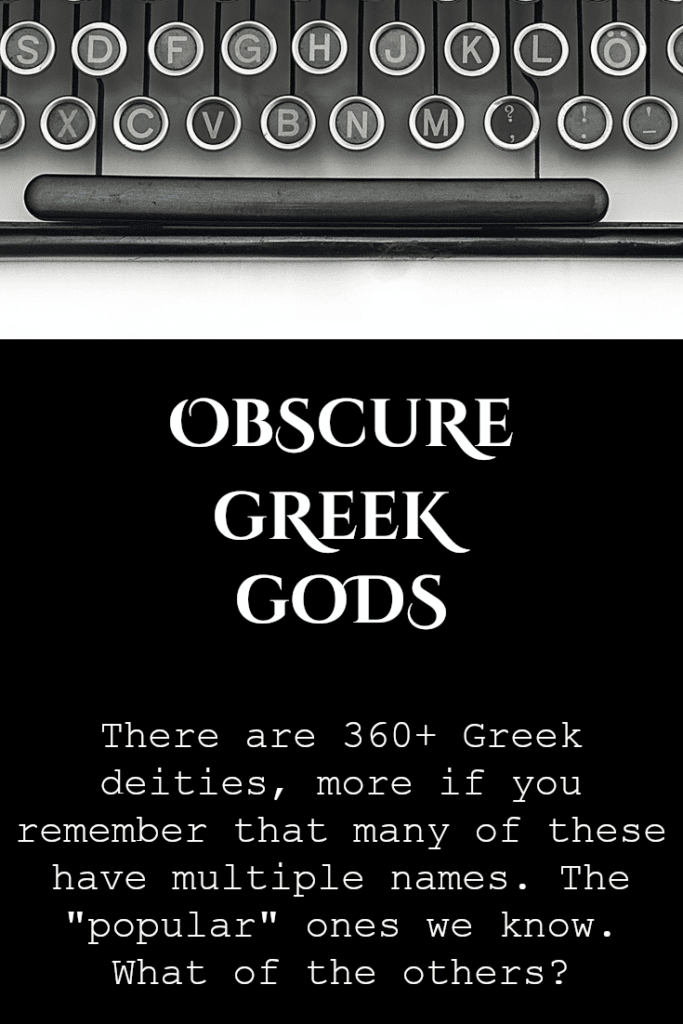Obscure Greek Gods
There are Greek gods and there are obscure Greek gods.
When I was in school, like most Americans, I was exposed to Greek mythology, either in an English class or history or perhaps in one of those electives chosen to fill the time. Whatever the case, most gods and demigods covered during those lessons were the “popular” ones–Zeus, Poseidon, Hera, Aphrodite and Hermes, Hades, Apollo, etc.
If you were ever curious about the genealogy of these gods, there is a vast supply of charts available on the Interwebz, one of which is linked below. It’s clickable, if you want to get more information on a particular god.

What is not shown in that family tree are many of the obscure gods or demigods. Some sources have listed 360 or so Greek deities, more if you remember that many of these have multiple names. So it’s probably not hard to imagine finding the more obscure ones and asking what stories revolve around them.
Here are a few from my adventures on the Internet:
Priapus – Maybe (or maybe not) the son of Aphrodite and Dionysus. Priapus was known as the god of fertility, male genitals, livestock, and fruits and vegetables. Cursed by Hera, Priapus was given impotence and born extremely ugly.
Demeter – Olympian goddess of harvest and agriculture. Her daughter was Persephone, who Hades adored and promptly kidnapped. As s a result of this relationship, Demeter stopped attending to the fields and the harvest to look for Persephone. Though Persephone was returned to Demeter, she was forced to visit Hades once a year. During that time, Demeter would stop attending the fields again and nothing would grow. Greeks labeled this time winter.
Epimetheus – Son of the Titan Iapetus and Clymene and brother of Prometheus. Epimetheus was known for being a wee bit slow, and his name translates as afterthought. Epimetheus was asked to make the first animals, and decided he would give all the best traits to them…neglecting humans. Kind of an “oops” moment.
The next two lesser-known gods/demi-gods, I have actually written about quite a bit.
Charon – You might know him as the Ferryman. Charon took the dead across the River Styx for a gold coin. If you didn’t pay up, you’d be forced to wander the shores for 100 years.
My start with Charon began innocently enough, and he has since appeared in at least 4 stories (that I can think of).
I blame Chris de Burgh and one of those awesome 80s videos that only slightly makes sense.
Finally, there is Kyamites (sometimes spelled Cyamites). – The demi-god/hero of the cultivation of beans–specifically, the broad bean. Not a whole lot has been written about Kyamites, but I took a shot at it in my latest novel Beans of Anafi.
This god needed some love, after all.
Kyamites is a small part of the Eleusinian Mysteries. Here is one of the only mentions:
On the road stands a small temple called that of Cyamites. I cannot state for certain whether he was the first to sow beans, or whether they gave this name to a hero because they may not attribute to Demeter the discovery of beans. Whoever has been initiated at Eleusis or has read what are called the Orphica knows what I mean.
– Pausanias, Description of Greece 1. 37. 4 (trans. Jones) (Greek travelogue C2nd A.D.)
You can’t make up anything better than Greek mythology. As written in Eleusis: Archetypal Image of Mother and Daughter by Carl Kerényi, which examines the Eleusinian Mysteries in more detail:
Beans belonged to the gods and spirits of the underworld. While Persephone dwelt in the underworld and Demeter was unable to see her, the earth was not permitted to bear fruit. That beans, a gift of the underworld, grew nevertheless, added to her rancor. It is probably to this that Pausanias is alluding in his description of the Sacred Road…Kyamites was probably a name for Hades.
Greek philosopher Pythagoras asked his adepts not to eat or mention fava beans. Apparently he believed they housed the souls of the deceased.
When I read about that, I had a novel.
Here’s a sample from the novel, which gives a little background into how Kyamites became associated with beans.
Kyamites shook his head. “When I was younger, I met a man on a road. He was a thinker, I believe, one of those people who spend their days talking about what life is and is not. He told me many things, things about life and death, about the path to Olympus and the road to Hades. And then he told me that when a man dies, his soul goes into a bean.”
Alexandros felt himself smile but stifled an outright laugh. “That is a funny story, mister. Did you believe him?”
Kyamites winked. “Oh, indeed. Yes, indeed. I think your father was keeping those souls he found alive. That is why he thinks they are special. When those beans are harvested again, they will be reincarnated.”
“Reincar— Wait. What if the bean spoils? What if the rains do not come one year and the crop withers? What if a donkey eats a bean? What then?”
Kyamites smiled. “That is why you tend to the bean farm as if it were the most precious thing. Remember, not all beans carry a soul, but do you know which ones do or do not?”
“According to my father, no, I do not.”
“He said you were not ready.”
“Yes.”
“Are you now?”
Alexandros did not answer right away. This was a ridiculous story, one that should be told around a campfire or in a taverna late one night while drunk.
A man and a woman walked in and Alexandros stood. He had customers to deal with, and although he wanted to stay and talk some more—even if it was about beans—he knew he had an obligation to Seth.
Kyamites grabbed Alexandros’s hand and pulled him closer. The smell of fish and salt stung the boy’s nose and made his eyes water. “You did not answer my question, Alexandros of Anafi. Are you ready to see the soul of a bean?”

















